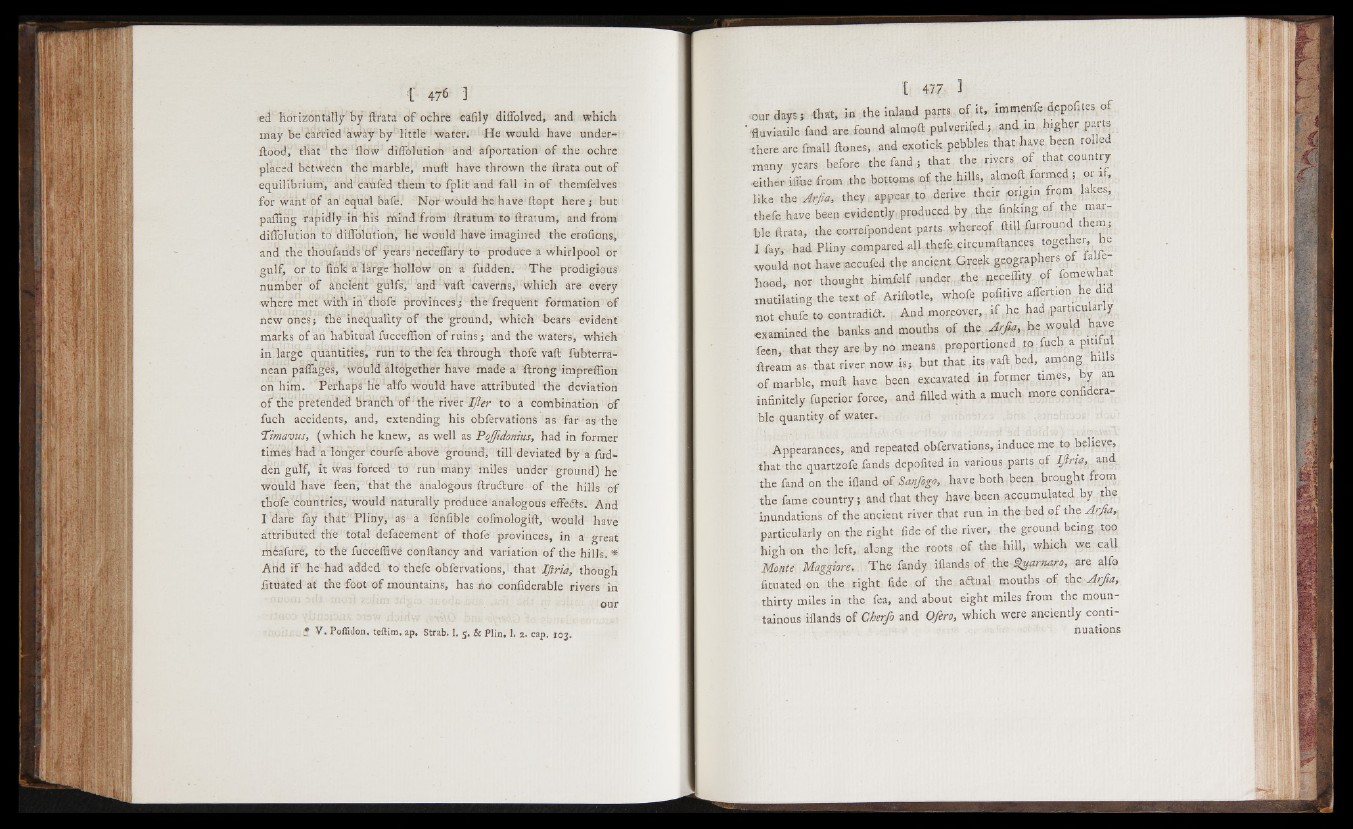
?ed horizontally by ftrata o f ochre eafily diffolved, and which
may be ¿kiried away by little water. He would have under-
ftood, tliat the Ilow diffolution arid afportation of the ochre
placed between the rriarhle, muft have thrown the ftrata out of
equilibrium, and' c au fed them to fplit and fall in o f themfelves
for want of an equal bafe. Nor would he have ftopt here ; but
palling rapidly in his mind from ftràtum to ftratum, and from
diffolution to diffolution, he would have imagined the erofions,
and the thoufands o f years neceffary to produce a whirlpool or
gulf, or to fink a large hollow on a fudden. The prodigious
number o f ancient gulfs;' 'and Vaft caverns, which are every
-where met with iri thofe provinces; the frequent formation o f
new ones; the'iriequality o f the ground, which bears evident
marks o f an habitual fucceffion o f ruins ; and the waters; which
in large quantities; run to the fea through thofe vaft fubterra-
nean paffages, would altogether have made a ftrong impreffion
oti him. Perhaps he alfo would have attributed the deviation
o f the pretended branch o f the river IJier to a combination o f
fuch accidents, and, extending his obfervations as far as the
Ttmavus, (which he knew, as well as PoJJidonius, had in former
times had a longer courfe above ground, till deviated by a fudden
gulf, it Was forced to run many miles under ground) he
would have feen, that the analogous ftructure o f the hills of
thofe countries, would naturally produce analogous effedis. And
I dare fay that Pliny,- as1 à fenfible cofmologift, would have
attributed die total defacement o f thofe provinces, in a great
mèafure, to thé fucceffive conftancy and variation o f the hills. *
Arid i f he had added to thefe obfervations, that Iftria, though
fituated at the foot o f mountains, has no confiderable rivers in
our
* V . Poffidon, teftim. ap, Strab. 1. 5. fc Plin. 1. 2. cap. 103.
•:our days; that, in the inland parts o f it, immenfeAepofites o f
•fluviatile fand are found almoft pulverifed; and m higher parts
there are fmall ftones, and exotick pebbles that have, been rolle
many years before the fand; that the rivers o f that country
either iffue from the bottoms o f the hills, a lm o f t formed ; or if,
like the Arfia, they appear to derive their prigip from lakes,
thefe have been evidently produced by the fiokwg of. the marble
ftrata, the eorrefpondent p a r t s , w h ^ e o f ; , f t i U iurround them;
I fay, had Pliny compared all thefeveircumftancfi together, ge
would not -have accufed the ancient Greek ,g^graphfF^°f
hood, nor thought himl'elf under the i)cceflity pf fotncwtl.^
mutilating the text o f Ariftotle, whofe p o f i f i v e a^mon . he did
not chufe to contradid. And moreover, i f he had particularly
-examined the banks and mouths of the Arfia, he would have
feen, that they are by no means proportioned to : fucli a pitiful
ft ream as that river now is; but that its vaft bed, among lulls
-of marble, muft have been excavated iu former times, by an
infinitely fuperior force, and filled with a much more confiderable
quantity o f water.
Appearances, and repeated obfervations, induce me to believe,
that the quartzofe fands depofited in various parts of JJlria, and
the fand on the ifland o f Sanfogo, have both been brought from
the fame country; and that they have been accumulated by the
inundations o f the ancient river that run in the bed o f the Arfia,.
particularly on the right fide o f the river, the ground being, too
high on the left, along the r o o t s o f the hill, which we call
Monte Maggiore. The fandy iflands o f the Quarnaro, are alfo
fituated on the right fide of the a£tual mouths o f tjht-firjia,
thirty miles in the fea, and about eight miles from the mountainous
iflands of Cherfo and Ofero, which were anciently continuations